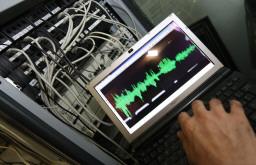The centre-right government willgo ahead with a contested measure restricting wiretapping to probes into organized crime or terrorism but will consult with magistrates - the plan's most vocal critics - when drafting the bill, Programs Minister Gianfranco Rotondi said on Monday.
''The cabinet agrees that laws on wiretapping need reforming. Of course, Justice Minister Angelino Alfano will work with magistrates in a joint effort to bring order to this sector,''' Rotondi said, likening the current slew of regulations to the Wild West.
During the weekend, Premier Silvio Berlusconi said the measure would allow prosecutors to carry out wiretaps only when probing organised crime or terrorist organisations. If the provision is approved, he said, anyone involved in carrying out any other types of wiretaps or in publishing transcripts would face a possible five-year prison term. The government argues that the measure is necessary to defend the privacy of citizens whose private conversations with suspects targeted by probes have, in recent years, often ended up in the press. The publication of leaked transcripts of wiretaps involving former Bank of Italy governor Antonio Fazio, the son of Italy's last king Victor Emmanuel and leading soccer personalities being probed in a soccer scandal two years ago caused a stir because they included the very private conversations of people unconnected to the investigations. Another objection is that large amounts of funds are wasted on inconsequential wiretaps, at a time when the government is trying to curb spending. Italy leads other European countries in the amount of wiretaps carried out annually by investigators, critics also note. Enrico Costa, majority representative in the House's Justice Committee, reported on Monday that Italy carries out some 100,000 wiretaps each year, compared to some 20,000 in France and an average of 5,000 in other European countries.
But opposition leader Walter Veltroni insisted that the measure would effectively clip prosecutors' wings by depriving them of ''an essential tool'' for probes on serious crimes like paedophilia, bribery and corruption.
He agreed, however, that curbs were needed to protect privacy rights.
''Publishing (of transcripts) should not be allowed...it's unacceptable for wiretaps to end up in the press,'' he told reporters during a visit to Berlin.
Opposition Senate Whip Anna Finocchiaro, a former magistrate, said new rules to govern the sector were needed but warned the government not to ''throw away the baby with the bathwater.'' ''Let's work together to agree on the rules while ensuring that we don't hamper prosecutors' investigations.'' The head of the country's journalists' union, Roberto Natale, reiterated journalists' criticism to the plan. ''We're absolutely against a wiretapping bill. Privacy rights have nothing to do with it. What's at stake is the taxpayers' rights to be informed,'' the FNSI Chairman told a meeting of colleagues on Monday.
The head of the opposition Italy of Values party Antonio Di Pietro, a former prosecutor in Milan's 'Clean Hands' probes into political corruption in the early '90's, said Berlusconi's proposal was ''very serious''.
Not allowing the publishing of transcripts was ''like holding a trial behind closed doors'' and would effectively prevent the media from informing the public about important investigations. The measure would also ''greatly reduce prosecutors' possibility to probe into crimes involving paedophilia, graft, corruption, financial crimes, usury, extortion and a lot of other criminal activity,'' he said.
But Alfano said he was certain the opposition and the majority would be able to work together when the government's bill comes up for debate in parliament.
''I'm optimistic that, aside the debate in the media, we can find a solution to this issue. For the good of the country, we have to find a constructive way of dealing with it,'' the minister told the House's Justice Committee.









